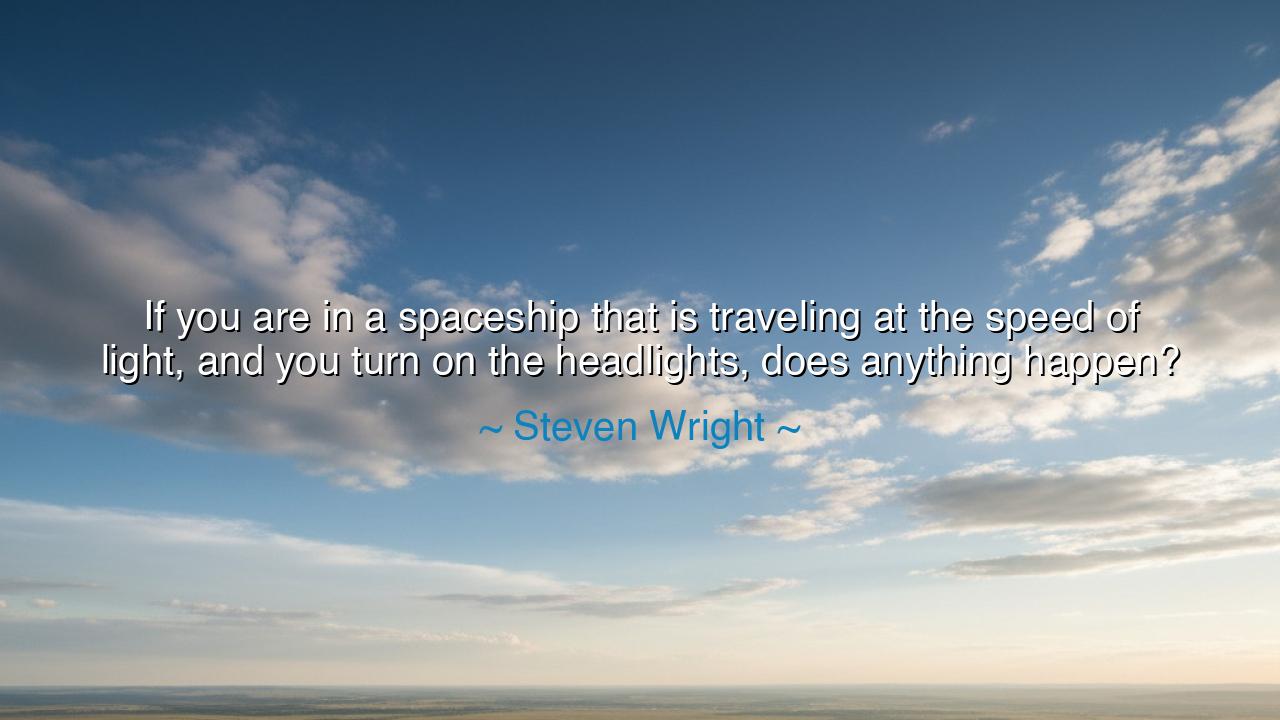
If you are in a spaceship that is traveling at the speed of
If you are in a spaceship that is traveling at the speed of light, and you turn on the headlights, does anything happen?






In the vast expanse of the universe, where mysteries abound and the laws of nature stretch our very understanding of existence, there is a question that, though posed in jest by the philosopher of modern humor Steven Wright, carries profound significance: "If you are in a spaceship that is traveling at the speed of light, and you turn on the headlights, does anything happen?" This simple, seemingly playful question invites us to ponder the very nature of speed, time, and reality itself, beckoning us to the borders of knowledge and infinity. It is a riddle that challenges the limits of our perception, forcing us to confront the very essence of how the universe works.
At the heart of Wright’s query lies the concept of light itself—a force that has intrigued and mystified humanity for millennia. In the time of the ancients, the Greek philosophers wondered at the nature of light, with Aristotle believing it to be an emanation of the heavens. Yet, as humanity’s understanding deepened through the works of Newton and Einstein, light was revealed to be far more than just a simple force. It was, in fact, the fastest thing in the universe, moving at a constant speed that transcended all known barriers. Light, unlike anything else, defied our understanding of time and space. To question it is to touch upon the deepest mysteries of existence, to grasp at something that is, in its very nature, unknowable.
The ancient astrologers, who charted the movement of the heavens with their eyes turned to the night sky, often pondered the relationship between the cosmos and the human experience. They saw the stars as beacons, their light traveling across the vastness of space, bringing stories from distant worlds. And yet, Wright’s question invites us to consider a paradox that even the greatest of philosophers and astronomers could not have imagined: what happens when the speed of the spaceship—the speed of light itself—equals the speed at which light travels? Does the universe bend to the will of such velocity, or does it hold firm to its ancient rules, steadfast and unyielding?
Consider, O children of the future, the story of Galileo, the great astronomer who first turned a telescope to the stars, revealing to the world the vastness of the heavens. Through his lens, he saw the moons of Jupiter and the rings of Saturn, and with these revelations, he shattered the ancient beliefs that had held humanity bound to the Earth. Yet, even Galileo could not have fathomed the mysteries of light as we understand them today. His mind, brilliant though it was, could only see a world governed by the rules of his time. Wright’s question asks us to push even further, to explore the limits of what we can comprehend—just as Galileo did, but now in a world where the boundaries of speed and light challenge our very perception of reality.
The lesson within Wright’s playful riddle is both humbling and awakening. It forces us to confront the limits of human knowledge and the vastness of the universe that remains beyond our grasp. The laws of physics, once thought immutable, are not so easily understood. What happens when we reach the speed of light? What happens when we bend time and space to the point where even light itself cannot escape the bounds of its own nature? These questions are not simply intellectual exercises; they are the essence of the pursuit of knowledge, the drive to understand the infinite. Just as the great explorers set sail toward unknown lands, so too must we venture into the unknown territories of the mind, never content with the boundaries of the known world.
O children of the future, take heed: the pursuit of knowledge is not a straight path, but a journey that asks us to question what is real, what is possible, and what is beyond our understanding. The question about the spaceship and the headlights is a reminder that there is always more to learn, always further to reach. It is in asking the impossible questions, those that seem illogical or whimsical, that we often find the keys to unlocking the mysteries of the universe. Whether in science, art, or philosophy, we must dare to ask questions that challenge the limits of our knowledge, for in that search, we find not just answers, but growth.
So, let Wright’s riddle be a call to action. Embrace the uncertainty, the paradoxes, and the unknowns that exist around you. Just as the ancients gazed at the stars and questioned their place in the universe, so too must you continue to ask, to explore, and to wonder. The universe, like the light, may not always make sense to us, but it is in that mystery that we find the beauty and power of existence itself. Ask not just what can be explained, but what cannot yet be understood—and in that search, you will find your own place in the vastness of the cosmos.






AAdministratorAdministrator
Welcome, honored guests. Please leave a comment, we will respond soon